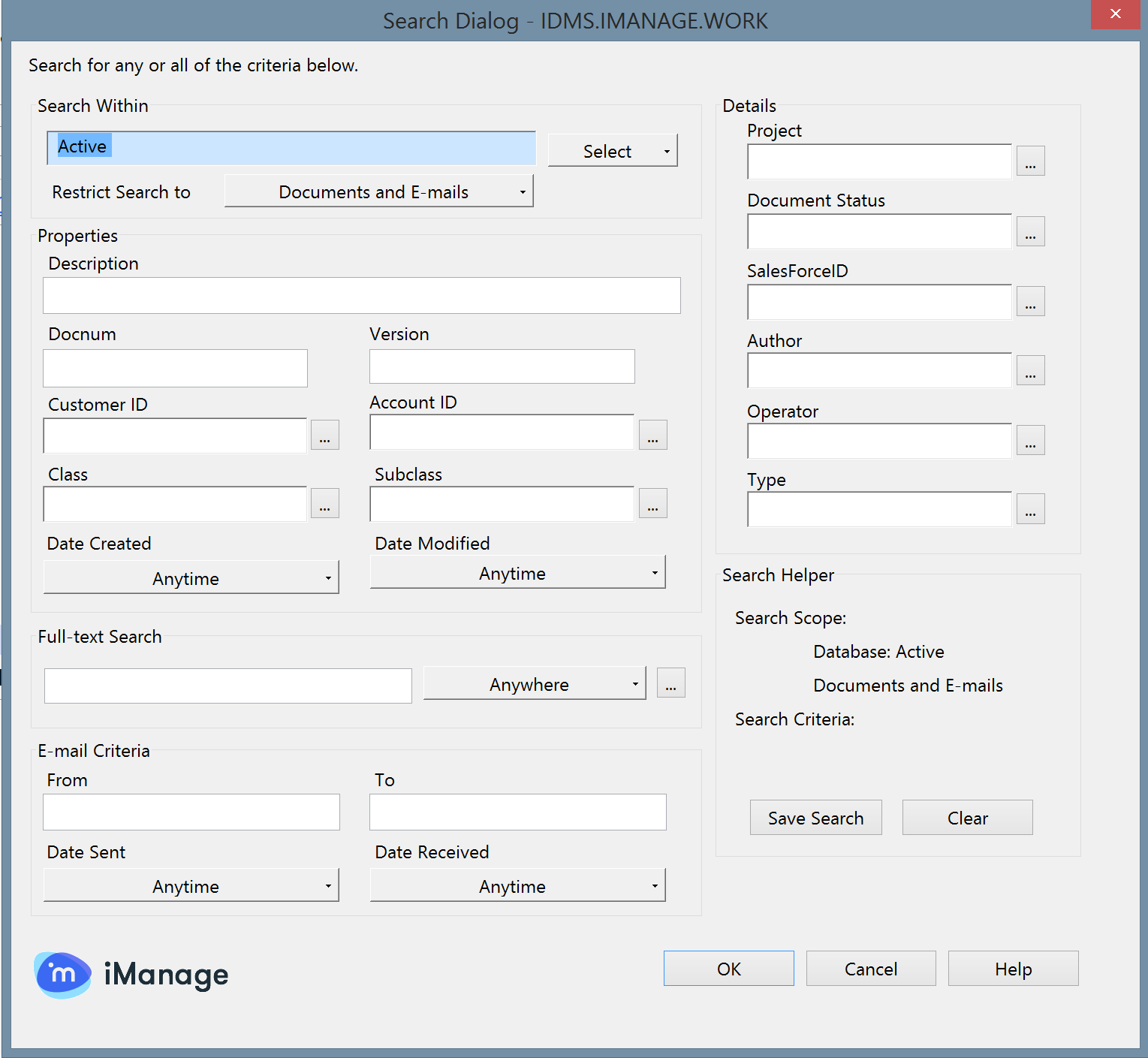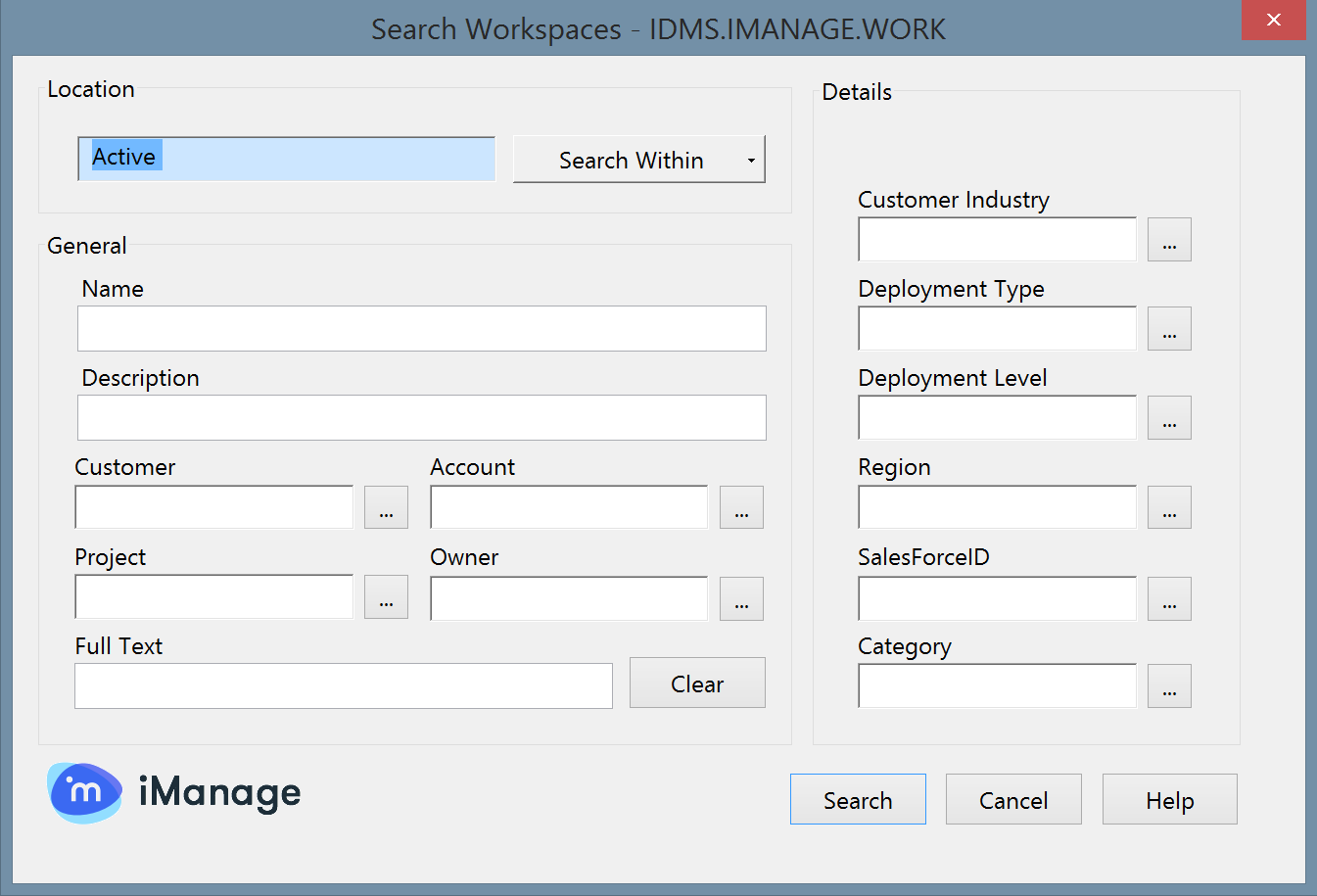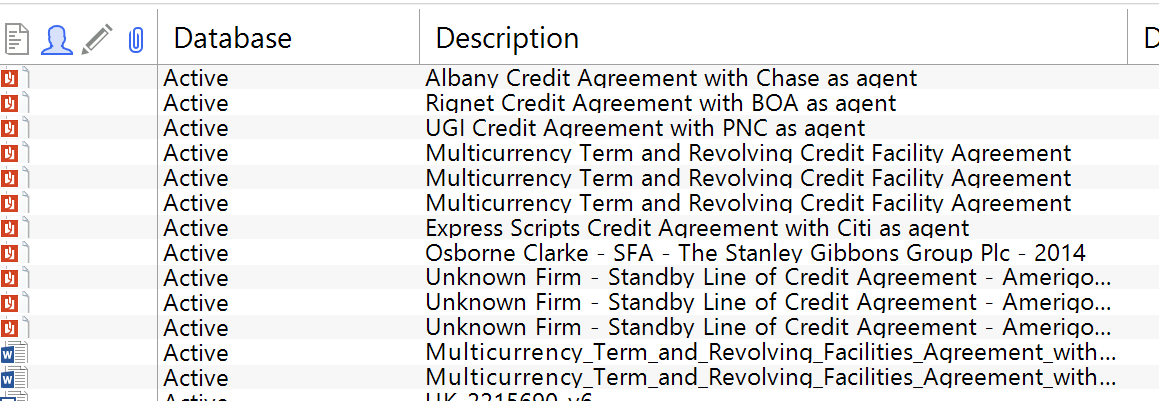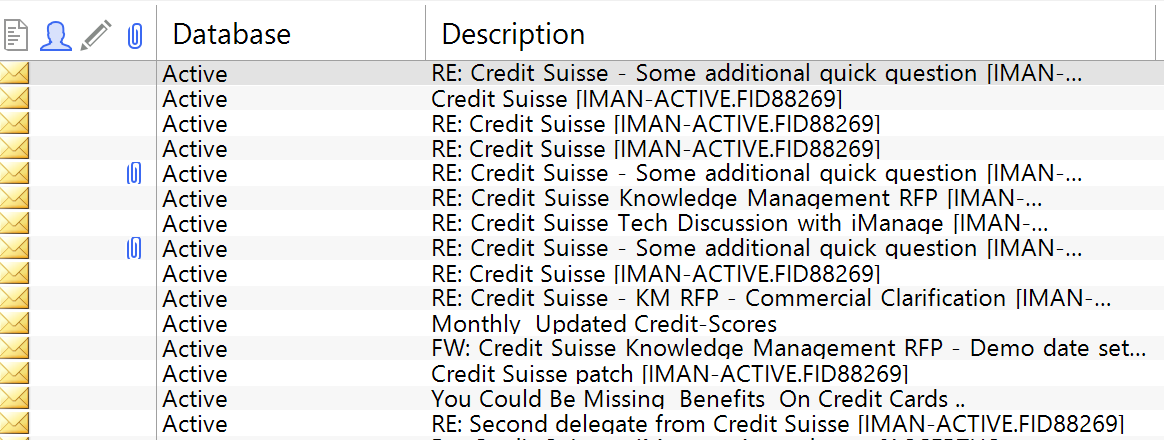Search tips for using iManage DeskSite and iManage FileSite with RAVN Indexer
This guide details best practices for content searching when using iManage Desktop Clients (Desksite and Filesite) 9.x and earlier.
Search techniques and tips covered in this guide include the following and more with examples of each:
- How to search with wildcards
- How to search with special characters
- How to improve your searches
The search behavior described assumes you are using iManage Work Server with Work Indexer powered by RAVN using the default settings.
In this guide:
- Default search behavior
- Types of RAVN indexer searches
- Search syntax
- Search time-out and error messages
- Search guidance for better results
Default search behavior
Before you begin searching, it is important to understand the default search behavior when conducting a full-text search. Two rules are in place as the base assumptions whenever you enter text into the full-text search fields:
- First, each search term is separated by an implicit AND operator. The AND operator returns documents containing all of the specified terms, in any order. For example, a search for credit agreement is treated as a search for credit AND agreement and returns documents that contain both terms in any order. See Using Boolean Operators for Search.
- Second, search for stemmed variations of each search term. For example, a search for credit agreement returns documents with variations of the root of each word. That means that the search returns documents with credit as well as credits and credited. Likewise agreement returns agreements. See Stemming.
Types of RAVN indexer searches
In this section:
- Full-text search with document name, workspace name, and description
- Wildcard search
- Boolean operators search
- Special characters search
- Language-based search
Full-text search with document name, workspace name, and description fields
The search used most often to find documents is the Description or Document Title search. When searching the Description profile field, it is important to understand that this field is treated as a full-text search field and all of the rules and techniques for full-text searching apply.
Figure: Document search dialog box

Figure: Workspace search Dialog box

Since the Description search is a full-text search, the default behavior returns documents that contain each search term, as well as variations, in any order within the Description.
The following searches trigger a full-text index search. If a search from a client targets any of the following fields, it is sent through to the indexer:
- Document Name/Description
- Comments
- Custom 13-16
- Anywhere
Additionally, search bars like Express Search or Email Management (EM) toolbar are also considered for the search.
Exact match search (exact word or exact phrase)
If you want to execute a search for the exact term or phrase, simply enclose the term(s) in quotation marks. Using quotation marks cancels out wildcards, special characters and other search operators (for example, AND, OR) that impact the search results. Quotation marks ensure that the search returns an exact match of the term(s).
When you enclose a search term in quotation marks (""), iManage Work searches for instances of that exact term, without stemming it.
For example, a normal search for help returns documents that contain the words helps, helpful, and helping. However, a search for "help" in quotation marks returns only documents with the exact term help.
A search for credit agreement returns documents with variations of the root term for each word. That means that the search will return documents with credit as well as credits and credited. Likewise agreement returns agreements as well as agree. However, a search for "credit agreement" returns only documents that contain the exact phrase credit agreement in that exact manner and order.
Figure: Exact phrase search
Search String: "Credit Agreement"

NOTE:
In addition to the Description field and the document content, non-validated custom text fields are also treated as full-text fields in a search. The custom text fields that are in use (or "used") can vary from firm to firm. For example, under Emails, To and From.
Alphanumeric string search
The goal of any search is to find a particular document or set of documents. The more specific the criteria, the greater the likelihood of quick and accurate results. Therefore, the most commonly used search terms are not real words but are codes or numbers that represent client or numbers representing client or customer IDs, dates, invoices and similar identifiers.
Alphanumeric and numeric characters are treated as searchable characters. There is no distinction between text, numeric and alphanumeric in the way they are processed by iManage Work Indexer. For example, Credit, Credit 123 or 123, all are processed in a similar way. There is no limit on the length of the alphanumeric or numeric terms.
The rules of searching for numbers or alphanumeric terms in the document content (that is, the actual document text) are the same as the rules for the Description field.
- If the search is for the exact number or alphanumeric term, no quotation marks or wildcards are needed to return the document.
- For example, if you are searching for a document with the title Invoice #553739, a Description search for 553739 will return that document.
- If the search term contains only a portion of the number or alphanumeric term, then wildcards are necessary to obtain a result.
- For example, if you are searching for a document with the title Invoice #553739, but only knew the first three numbers of the invoice code, use a search for 553* to retrieve documents with terms in the title that begin with 553, including Invoice #553739.
- When searching for dates in full-text, keep in mind that special characters are treated differently depending on whether the search term is enclosed in quotation marks.
- For example, an unquoted search for 10/29/07 is actually interpreted as a search for 10 OR 29 OR 07 and returns documents that have one or any of these three numbers in any order. Consequently, the best practice when searching for dates in full-text is to enclose the date string in quotation marks. This yields the best search results. For instance, a search for "10/29/07" will return documents with 10/29/07. However, since the slash is a special character, the search will also return documents with 10 29 07, 10.29.07, and 10-29-07.
Wildcard search
A wildcard search in iManage Work is designed to return expanded variations of search term(s). This is a powerful search technique which allows users to search for a term where some of the characters are unknown.
NOTE:
Wildcard searches are more expansive and may take longer to run than non-wildcard searches.
iManage Work supports wildcard characters. iManage Work supports single and multiple character wildcard searches within single terms. You can apply wildcard characters to single terms, but not to search phrases.
There are two wildcard characters – the question mark (?) and asterisk (*).
Use question mark (?) as a wildcard in place of a single unknown character.
NOTE:
You cannot use a ? symbol as the first character of a search (leading wildcards). The ? symbol represents 1 character.
For example, if you are uncertain whether a name is Smith or Smyth, entering Sm?th will return documents that contain either name variation. Similarly, a search for b?rn will return documents that match the word born, barn or burn.
- Use asterisk (*) as a wildcard in place of any number of unknown characters.
For example, a search for m*or returns all documents that contain words such as major, mayor, and mentor. Wildcards can be used in the beginning, middle or end of a search term. A search for *vert* will return documents that contain convertible, inverted, vertigo, and covert. Similarly, a search for auto* will match the words automobile, autograph, and autobiography.
NOTE:
For all iManage Work Desktop Clients (DeskSite/FileSite 9.x and earlier), clear (disable) the Add wildcards in description field when searching check box in Advanced Options. In these versions, the Description search is a simple exact pattern match search that relies heavily upon the use of wildcards to obtain accurate results. Enabling this setting with the advanced full-text capability in place changes the meaning of the query and results in an inaccurate search.
For example, A search for *truck* would return documents which contain struck.
Boolean operators search
iManage Work Indexer accepts simple or complex Boolean and bracketed Boolean expressions, and returns a list of matching documents. You can form Boolean expressions using a range of Boolean operators:
Boolean operator | Description |
|---|---|
| Requires both terms on either side of the Boolean operator to be present for a match. |
| Requires that either term (or both terms) be present for a match. |
| Requires that the following term not be present. |
Figure: AND operator
Search String: Credit AND Agreement

Figure: NOT operator
Search String: Credit NOT Agreement

Grouping terms: iManage Work Indexer supports multiple Boolean connector searches. For example, landlord OR tenant AND guarantor, landlord OR tenant OR guarantor, landlord OR tenant NOT guarantor, and more.
NOTE:
When specifying Boolean operators such as AND or NOT, the operators must be in all uppercase.
Special characters search
When conducting full-text searches for the profile metadata or the document content, you must understand how special characters are interpreted in the context of the search. Special characters are non-alphanumeric characters, such as punctuation marks.
The following characters have special meaning within the context of a search and can be used as follows:
- Use question mark (?) as a wildcard in place of a single unknown character.
For example: If you are uncertain whether a name is Smith or Smyth, enter Sm?th to retrieve all documents that contain either name variation. - Use the asterisk (*) as a wildcard in place of any number of unknown characters (including no extra characters).
For example: A search for m*or returns all documents that contain words such as major, mayor, and mentor. - Use quotation marks (") to conduct a phrase search for the exact term or phrase enclosed between the quotation marks.
For example: A search for "three blind mice" enclosed in quotation marks will return only documents with the exact phrase, in this exact order.
It is important to remember that a phrase search in iManage Work does not return documents that include any variation of the phrase, no matter how slight. This means that none of the following documents are returned, including documents that have:- a typographical error in the phrase (thre blind mice)
- all three words in a different order (blind three mice)
- all three words in the right order, but not consecutively (three blind white mice)
NOTE:
The exceptions to the exact match rule in phrase searching include phrases with stop words or special characters.
For example, a search for "in theaters now" is effectively a search for "theaters" since the terms in and now are both considered stop words. Consequently, a search for "in theaters now" will return documents containing the exact term "theaters" including those containing the full phrase "in theaters now". This means that if no documents exist with "in theaters now", the search could still return document containing only theaters.
- By default, transliteration is performed while indexing. Accented characters can be found by searching for their non-accented counterpart. For example, êtes can be found by searching for 'etes'.
The following special characters are treated as blank spaces at the time of indexing. Some of these characters are used as search operators.
~ ! @ # $ % ^ & * () _ + {} | [] \ : ; <> = _ ? , . /
For example, hello-world becomes hello and world in the index. When you search for hello-world, the results return documents including the terms hello, world, hello world, hello-world, and so on.
Language-based search
iManage Work Indexer searches for content in a default language. This default language configuration in done in iManage Core Schema files. By default, the default query language setting is English at the time of deploying iManage Work Indexer.
When searching for indexed content in documents in the default language, all the valid search parameters entered in the default language return results. Additionally, if the document search contains terms in any other language (which iManage Work Indexer is configured to query), the query returns valid search results.
For example, when a query is performed on an English document, it returns results for Contract Value (an English term) as well as Force Majeure (a French term), if these terms exist in the document.
In this section:
Stemming
By default, full-text searches in iManage Work return variations of the search term. This behavior is known as stemming. iManage Work Indexer automatically stems the search term when it processes a search and returns variations of the search term.
Stemming is a sophisticated search technique wherein the search term is reduced to its base root in order to broaden the search to include terms that share the same root. For example, a search for test would return documents with test as well as testing, tested and tester. However, the search would not return the word testament. This process can broaden searches to include all variations of a term.
Stemming is done based on natural language rules, and is not just based on a small portion of the actual term. Language specific stemming algorithms are used to stem words.
Stop words
Stop Words are common words that typically modify the meaning of other words but carry no inherent meaning themselves, such as adverbs, conjunctions, and prepositions. Words such as "the" or "a" are used too frequently to carry any significance within a search query. As a result, such terms are generally excluded, or stopped, and effectively ignored when entered as search criteria. Entering a search that contains only stop words will return zero results even though the word may in fact exist in all documents.
However, in iManage Work Indexer (powered by RAVN) unlike previous indexers, the language-specific stop words files are left blank by default as including stop words in the search criteria does not affect the search performance. Stop words are not omitted when searching and the search results include the content that contains the stop words. Entering a search that contains only stop words will return results. Stop words affect searches with or without quotes.
- An unquoted search (the default search) with stop words returns documents that contain each search term, as well as variations, in any order within the document - including the stop words.
- For example, in a search for look at the cars, the indexer will return documents with look, at, the, and car (along with stemmed variations) and in any order.
- A quoted search with stop words returns documents that contain the exact phrase in the exact manner and order quoted - including the stop words.
- For example, in a search for "look at the cars" the indexer will return documents containing the exact text "look at the cars".
NOTE:
A firm can add, if desired, a custom list of terms to be considered as stop words when performing full-text search in the stop words file. Stop word lists are configurable and can vary from firm to firm.
Protected words
Certain words can be prevented from getting stemmed while indexing and querying. iManage Work Indexer is configured to allow such words to be indexed or queried as a unit. A default protected words text file is present in the installation directory. However, this file is blank to start with and can be populated with the relevant protected words, if and as required.
For example, if you have included a word agreement in the protected words file, then even if you enter agreement in the search field without placing it in " ", the word does not get stemmed, and only content that explicitly contains the word agreement is returned in the search results.
Synonym search
iManage Work Indexer supports synonym searches. Users can perform a synonym search when they submit a full text search. By default, synonym terms are not defined in iManage Work Indexer. You must populate a text file with the synonym terms relevant to your organization.
Search syntax
The following table lists the search operators supported for full text searches.
Type of search | Search operator | Use case | Example |
|---|---|---|---|
Searching for an exact match for a word or a phrase. | " " | To execute a search for the exact term, enclose the term within double quotes. | A search for invoice returns documents containing the words invoices, invoiced, and invoicing. However, a search for "invoice" enclosed in double quotes returns documents with the exact term invoice. A search for "credit agreement" returns documents with the exact phrase credit agreement. |
Searching with wildcards | ? (Question mark) | Use ? as a wildcard in place of a single unknown character. You cannot use the ? symbol as the first character of a search (leading wildcards). | If you are uncertain whether the term is Duty or Duly, enter Du?y to return documents containing either term. |
* (Asterisk) | Use * as a wildcard in place of any number of unknown characters (including no extra characters). | A search for s*tion returns all documents containing words such as section, station, and sanction. A search for *ment* returns documents with terms such as judgement, amendment, and enactment. A search for *ion matches the words such as termination, addition, and limitation. | |
Searching for documents containing two specific terms. | AND | The AND operator locates documents containing both the terms on either side of it. This operator must be entered in UPPERCASE. | To find documents that contain the words Amendment and Termination, type: |
Searching for documents by a term on either side of the document title. | OR | The OR operator finds documents that contain at least one of the terms on either side of it. It enlarges the search scope, and is normally used to look for terms that have similar meaning or refer to similar subjects. This operator must be entered in UPPERCASE. | To find documents with one or both of the words section and addition, type: |
Searching for documents by a specific term. | NOT | The NOT modifier is used with the AND and OR operators, to exclude documents that contain a given term. For the NOT modifier to work, you must first enter a positive search criteria. This operator must be entered in UPPERCASE. | To find documents that contain the words sanction and termination but not the word enactment, enter:
|
Search time-out and error message
In most cases, searches are executed quickly and return results instantly. However, if you receive an error or unexpected results, here is a list of tips to try before running the search again:
- Try lowering the value of Searches return a maximum of n documents in Advanced Options. A value of 500 or less is recommended. Setting this value to a higher number results in longer execution times for searches, and those that contain common terms, such as tax or litigation, can return a large result set.
- Confirm that the Add wildcards in description field when searching setting is disabled (unchecked) in the Advanced Options. As a best practice, wildcards should be added explicitly to a query rather than automatically to ensure you get the best possible search results. To check if wildcards were inserted into your query, view the Search Helper in the Search History profile screen.
- Increase the search timeout value in Advanced Options incrementally in 15 to 30 second intervals. Searches for common terms that return a large result set lead to longer search execution times. Increasing the timeout increases the client-side execution time.
- Check the search criteria for special characters that may result in an invalid search, and remove the character(s).
- Check the search criteria for stop words. An error is returned if a search contains only stop words. Add terms to the full-text search that are not stop words and execute the search again.
Clear the search profile using the Clear button and confirm that the Search Helper in the profile screen is blank.
After the search is cleared, add a search parameter, execute the search, and review the result set. If the search is successful, continue to add criteria until you identify the search parameter that triggered the error.
Search guidance for better results
If a search does not return the document you want to retrieve, try the following tips before running the search again:
- Search for the document using profile attributes, such as the document number without any full-text criteria. If the document is not retrieved, it might be due to various reasons, such as the document being deleted, and changed security access.
However, if the document is retrieved with a simple document number search then it is possible that the document has not yet been full-text indexed. - In Advanced Settings, disable the Show Latest Version Only option and enable the Show All Versions option. If the document appears in the search results when selecting this option, the issue may be due to your security access to the latest version or could indicate a problem with the full-text index.
- Check the search query for potential stop words or special characters. Try to reformulate the query with other terms in the target document.
- Enclose the full-text portion(s) of the search in quotation marks.